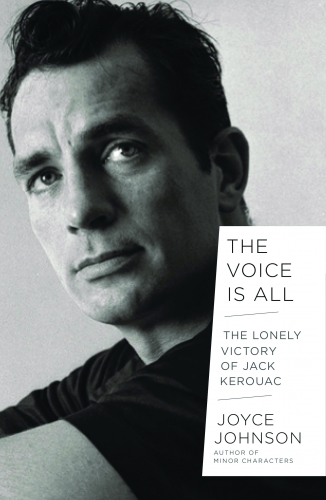
The Voice Is All: The Lonely Victory of Jack Kerouac
By Joyce Johnson
Viking Press, 2012
512 pp.; $32.95 hardcover
“[Kerouac] was the first one I heard chanting the Three Refuges in Sanskrit, with a voice like Frank Sinatra.”
—Allen Ginsberg, in an interview in New Age Journal, April 1976.
In 1941, I was newborn and oblivious to the ways that post–WWII anti-Communist fervor and the fears roiled by the existence of the atomic bomb had produced a stifling culture from which many creative people sought release. In that year, Jack Kerouac dropped out of Columbia University to join those peers and seek his authentic self as an artist.
In 1957, I was 16 and equally hungry for cultural and spiritual alternatives to the science-worshipping, materialistic, suburban paradigm of my environment. In September of that year, Kerouac’s On the Road was published to great acclaim. The black cover of the 1957 Viking edition was a talismanic calling card, suggesting to me that any individual possessing that book perhaps sought relief from the same restless loneliness plaguing me. Today, I would characterize that early unease as a yearning for wisdom.
Jack’s social fears, his shame at his French-Canadian “Canuck” accent, and the years of struggle required for him to write and speak flawless English were of a piece with his determination to seek an American voice. To that end, he jettisoned his earliest literary gods, Dostoevsky and Tolstoy, in favor of Emerson, Thoreau, Whitman, Mark Twain, and Thomas Wolfe. Through the Transcendentalists, Kerouac was introduced and attracted to Eastern thought—its inclusiveness, vastness, and compassion affected him deeply—and Buddhism became associated in the public mind (and consequently in my mind) on a number of levels familiarizing what had previously been an “exotic” foreign religion. Kerouac and his cohorts became known as “The Beats” and for many of my generation they became the “brand” of our comparable search.
By the late 1950s and early 1960s the writings of the Zen teacher D. T. Suzuki were being passed among cognoscenti; Lawrence Ferlinghetti had published a popular book on Buddhism, and Allen Ginsberg, Lew Welch, Gary Synder, Kerouac, and others began exploring Buddhism in depth. Snyder, who later became a Zen Buddhist priest and teacher of renown, exerted such an influence on Kerouac that Kerouac made him the model for Japhy Ryder, the mountain-climbing Zen-sage protagonist of his novel The Dharma Bums.
Reading The Voice Is All, Joyce Johnson’s biography of Kerouac, I’m reminded of my teenage self. I romanticized Kerouac, and imitated his excesses in pursuit of my callow understanding of “freedom.” The Beats appeared as an entire cultural package to me: new thoughts, new religious ideas, new politics, a newzeitgeist, which I found more compelling than the current offering.
Through Kerouac I was first introduced to Buddhism. I remain grateful to him for the introduction, and despite some false starts, have followed it diligently for 40 years and ordained as a Zen Buddhist priest. My gratitude does not disguise a critical distance from Kerouac in this regard, however. Others who may share a similar gratitude may have likewise determined for themselves that Kerouac’s Buddhism was a vestment covering his core Catholicism and not the other way around.
Today I think that Kerouac was punished by a superficial understanding of “emptiness.” (Which he referred to as “the void”). This sense of nothingness colored his understanding negatively. For most Buddhist students, shunyata (in English we translate this imprecisely as “emptiness”) is not a void but an expression of profound interdependence. It affirms Buddha’s core insight that a discrete, separate self is a fiction in a world in which everything is a composite of non-self ingredients.
Joyce Johnson—who had a two-year relationship with Kerouac—categorizes Kerouac’s understanding as a “tormented interpretation of Buddhism.” Kerouac himself instructed her “not to think about having a child” by him, since to give birth to a baby was “to bring death into the world.” I might drink to excess as well if I felt that the most profound opportunity for liberation from the apparent contradictions of good and evil offered me nothing more than the frigid nullity of “a void.”
In this regard, Kerouac was an unreliable guide. Yet I remain grateful for his explorations and the intuitions of his expanded heart. My life would be neither as developed, useful, or satisfying today had he not signaled through his own suffering and indicated the Way. Like Moses denied access to the Promised Land, Kerouac’s inability to extricate himself from the dualisms of Christianity and Judaism remains an enduring sadness to me. I am the beneficiary of a freedom he made available to me yet was denied himself.
It’s a credit to Ms. Johnson’s insight and tender respect that these contradictory attributes of Kerouac remain suspended and in motion in her descriptions. The Voice Is All is kept vivid and refreshed on each page by her adroitness as a juggler of themes: Faith, Doubt, Freedom, Responsibility, Ecstasy, and Guilt swap places like partners at a square dance.
Statues of great heroes are not diminished by tarnish and pigeons, and living beings are not reduced by their contradictions and flaws. It is a measure of Kerouac’s greatness that he discovered in his literature a canvas suitable to the scale of his passions. He managed to indicate the Big Mind, where contradictions do not cancel one another out but remain eternally vivid “postcards from emptiness,” to quote Shunryu Suzuki’s term for the manner in which the universe reveals its essential nature in each moment. I’m grateful for the opportunity to have read this book and recommend it highly. I offer a deep bow of gratitude to Mr. Kerouac and his empathic translator, Joyce Johnson.
Thank you for subscribing to Tricycle! As a nonprofit, we depend on readers like you to keep Buddhist teachings and practices widely available.